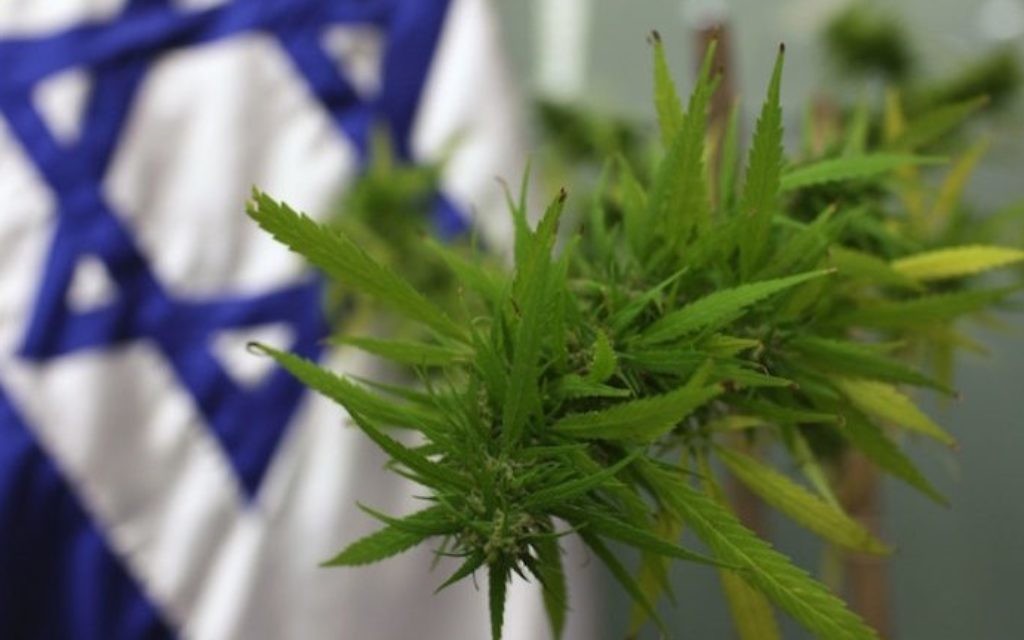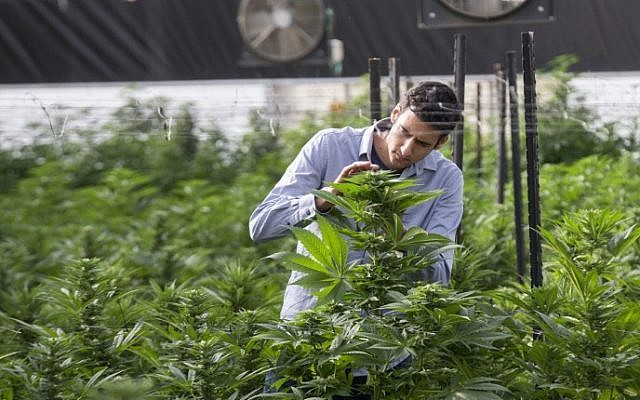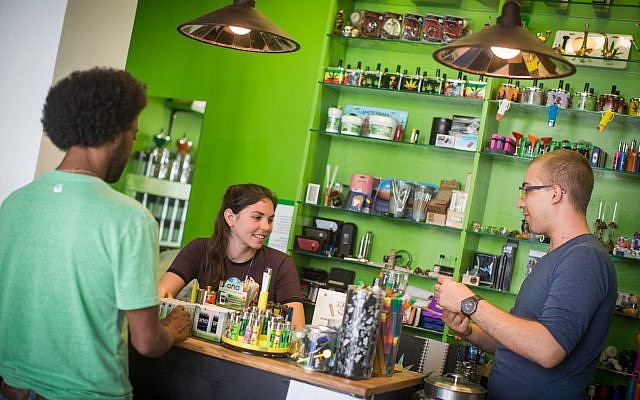With a decrease in opposition from the US, Israeli growers, with government backing, are pushing forward with plans that could net the country $1 billion in tax revenue
By Anis Modi
A
cannabis plant was brought to the Knesset in 2009 for the Labor Welfare
and Health Committee, which was addressing the issue of medical
marijuana. (Kobi Gideon/Flash 90)
WASHINGTON (JTA) — This week, the Israeli cabinet unanimously
approved legislation that will allow local cannabis companies to start
exporting medical marijuana, making Israel the third nation in the world
where it is legal to do so.
According to the latest available estimates from Israel’s Ministry of Finance, exporting marijuana could result in up to $1 billion in tax revenue for the country. The global legal cannabis market is expected to grow to $57 billion by 2027, and there is a clear economic advantage to entering the international market early.
But the road to legal export has not been easy. While medical
marijuana use has long been legal in Israel for the treatment of severe
health conditions, export and recreational use have not been. Israeli
officials tasked with keeping recreational marijuana from the Israeli
public originally balked at the export proposal.
The cannabis export law has been stalled primarily over security and public health concerns, as well as political opposition from abroad. But a recent shift in the Trump administration’s prosecutorial approach has given the startup nation the necessary incentive to finally enter the global market.
 While President Barack Obama was still in office, the Israeli
government began laying the legal groundwork for domestic medical
marijuana production. But the 2016 election of Donald Trump, a newly
minted member of the party in which being seen as soft on drugs is
political suicide, threw a wrench in the implementation plans. While
Israel was trying to create an industry, US Attorney General Jeff
Sessions made clear that he was ending the Obama administration’s lax
approach to marijuana.
While President Barack Obama was still in office, the Israeli
government began laying the legal groundwork for domestic medical
marijuana production. But the 2016 election of Donald Trump, a newly
minted member of the party in which being seen as soft on drugs is
political suicide, threw a wrench in the implementation plans. While
Israel was trying to create an industry, US Attorney General Jeff
Sessions made clear that he was ending the Obama administration’s lax
approach to marijuana.
But by early November 2018, Sessions was out of a job – and Israel’s parliament seized the moment.
Israeli laws governing the export of medical marijuana have been in the works since 2011, when the government established an office to deal exclusively with the subject, and it’s been a nine-year fight to get to where we are today.
In June 2016, the Israeli government passed decision number 1587, which established the legal precedent for medical marijuana and allowed farmers and medical companies to apply for cannabis export licenses.
According to the Ministry of Agriculture, eight Israeli companies were licensed to grow medical cannabis for domestic consumption as of April 2018. There are also more than 900 pending applications for new farms, factories and pharmacies.
 But in a February 2018 government meeting, Prime Minister Benjamin Netanyahu reportedly said that Trump had personally conveyed
“his general opposition to the legalization of cannabis.”
But in a February 2018 government meeting, Prime Minister Benjamin Netanyahu reportedly said that Trump had personally conveyed
“his general opposition to the legalization of cannabis.”
Netanyahu added that “The administration’s position is clear on this,” and he was not sure Israel should butt heads with the US over the issue.
The United States is by far Israel’s largest trading partner. According to the Israeli Export Institute, which is part of the Ministry of Finance, the US imported more than $11 billion in goods and services from the country in 2017 and was responsible for more than 26 percent of Israeli global trade that year. It would make sense that Netanyahu would not want to anger the Trump administration over an infant industry like medical marijuana.
Of course, that was nearly a year ago, and change comes quickly in Trump times. In 2018, Sessions as attorney general was still waging a personal war against marijuana and ignoring Obama-era guidance that encouraged prosecutors to refrain from making cases against recreational use in areas where such use is legal on the state level.
 But Sessions’ presumed replacement, William Barr, said during his
confirmation hearing that the “current marijuana situation is
untenable.” While he added that he is not a supporter of federal
legalization, Barr later clarified that he plans to follow Obama-era
guidelines and generally refrain from prosecuting state-legal cannabis
businesses. Alongside new bipartisan bills supporting research into
medical marijuana and a recent farm bill that legalized growing hemp, it
seems that cracking down on the cannabis industry is not the sticking
point it once was for the Trump administration.
But Sessions’ presumed replacement, William Barr, said during his
confirmation hearing that the “current marijuana situation is
untenable.” While he added that he is not a supporter of federal
legalization, Barr later clarified that he plans to follow Obama-era
guidelines and generally refrain from prosecuting state-legal cannabis
businesses. Alongside new bipartisan bills supporting research into
medical marijuana and a recent farm bill that legalized growing hemp, it
seems that cracking down on the cannabis industry is not the sticking
point it once was for the Trump administration.
In addition to a change in US policy, domestic security concerns that originally stalled the Israeli law’s implementation and caused gridlock have since been resolved. The Ministry of Public Security demanded increased authority and funding, and the Ministry of Finance tried to minimize the government’s expenses in connection to the law.
Ultimately, Public Security Minister Gilad Erdan and Knesset member Yoav Kisch approved the advancement of the law allowing for marijuana export in November, once Erdan’s office received increased funding and oversight over growers (and once Sessions was officially out of their way).
Although they could not export cannabis directly until now, many of Israel’s leading marijuana producers have already focused on expanding sales and facilities outside of the country.
 The Israeli cannabis company Together recently signed a two-year deal
to supply $300 million worth of medical marijuana to the Canadian
market, bought a German marijuana outfit for 2 million euros and
operates a farm while also building a factory in Uganda. Other Israeli ventures are eyeing European destination such as Denmark and Portugal.
The Israeli cannabis company Together recently signed a two-year deal
to supply $300 million worth of medical marijuana to the Canadian
market, bought a German marijuana outfit for 2 million euros and
operates a farm while also building a factory in Uganda. Other Israeli ventures are eyeing European destination such as Denmark and Portugal.
Now that the export of medical cannabis is legal, growers predict that both tax revenue and the ability to do research will increase dramatically.
Sid Taubenfeld, CEO of TO Pharma, the American medical and research division of the Israeli cannabis company Tikun Olam, told JTA by phone that the new law will help Israel become a global leader in the field.
 “We’re doing studies in Israel, and we’re going to do studies in
Canada now,” he said. “The rest of the world is playing catch up.”
“We’re doing studies in Israel, and we’re going to do studies in
Canada now,” he said. “The rest of the world is playing catch up.”
Along with the significant economic windfall expected, this development will help Israel get a head start in this growing market and maintain its reputation as a global hub for medical and business innovation. While the United States is not as progressive when it comes to drug policy, other interests in both camps will prevail.
More than anything, the fact that the whisperings of the president of the United States seem to have superseded the wishes of Israel’s democratically elected representatives makes clear that the US-Israel relationship is not a relationship of equals. While Israel has certainly enjoyed a warmer relationship with the Trump administration than with the previous administration, that closeness sometimes comes at a cost.
But Taubenfeld told JTA that he isn’t too worried about the future of his industry.
As he put it, “Trump has other problems to worry about besides cannabis.”
According to the latest available estimates from Israel’s Ministry of Finance, exporting marijuana could result in up to $1 billion in tax revenue for the country. The global legal cannabis market is expected to grow to $57 billion by 2027, and there is a clear economic advantage to entering the international market early.
The cannabis export law has been stalled primarily over security and public health concerns, as well as political opposition from abroad. But a recent shift in the Trump administration’s prosecutorial approach has given the startup nation the necessary incentive to finally enter the global market.

Illustrative: An Israeli agricultural
engineer inspects marijuana plants at the BOL (Breath Of Life) Pharma
greenhouse in the country’s second-largest medical cannabis plantation,
near Kfar Pines in northern Israel, on March 9, 2016. (Jack Guez/AFP)
But by early November 2018, Sessions was out of a job – and Israel’s parliament seized the moment.
Israeli laws governing the export of medical marijuana have been in the works since 2011, when the government established an office to deal exclusively with the subject, and it’s been a nine-year fight to get to where we are today.
In June 2016, the Israeli government passed decision number 1587, which established the legal precedent for medical marijuana and allowed farmers and medical companies to apply for cannabis export licenses.
According to the Ministry of Agriculture, eight Israeli companies were licensed to grow medical cannabis for domestic consumption as of April 2018. There are also more than 900 pending applications for new farms, factories and pharmacies.

Agriculture Minister Uri Ariel tours a greenhouse growing medical cannabis. (Courtesy)
Netanyahu added that “The administration’s position is clear on this,” and he was not sure Israel should butt heads with the US over the issue.
The United States is by far Israel’s largest trading partner. According to the Israeli Export Institute, which is part of the Ministry of Finance, the US imported more than $11 billion in goods and services from the country in 2017 and was responsible for more than 26 percent of Israeli global trade that year. It would make sense that Netanyahu would not want to anger the Trump administration over an infant industry like medical marijuana.
Of course, that was nearly a year ago, and change comes quickly in Trump times. In 2018, Sessions as attorney general was still waging a personal war against marijuana and ignoring Obama-era guidance that encouraged prosecutors to refrain from making cases against recreational use in areas where such use is legal on the state level.

US Attorney General Jeff Sessions attends
a news conference at the Justice Department in Washington, Friday, Aug.
4, 2017. Sessions has warned of a crackdown on marijuana. But documents
obtained by The Associated Press show he’s getting no fresh avenues
from a special task force formed to find the best strategy. (AP Andrew
Harnik)
In addition to a change in US policy, domestic security concerns that originally stalled the Israeli law’s implementation and caused gridlock have since been resolved. The Ministry of Public Security demanded increased authority and funding, and the Ministry of Finance tried to minimize the government’s expenses in connection to the law.
Ultimately, Public Security Minister Gilad Erdan and Knesset member Yoav Kisch approved the advancement of the law allowing for marijuana export in November, once Erdan’s office received increased funding and oversight over growers (and once Sessions was officially out of their way).
Although they could not export cannabis directly until now, many of Israel’s leading marijuana producers have already focused on expanding sales and facilities outside of the country.

There are about 100 plants in different
stages of growth at the Volcani Center greenhouses, pictured here with
Dr Dvory Namdar, the chief chemist and research associate and her
assistant at the government’s marijuana greenhouses on June 27, 2018.
(Melanie Lidman/Times of Israel)
Now that the export of medical cannabis is legal, growers predict that both tax revenue and the ability to do research will increase dramatically.
Sid Taubenfeld, CEO of TO Pharma, the American medical and research division of the Israeli cannabis company Tikun Olam, told JTA by phone that the new law will help Israel become a global leader in the field.

Medical marijuana smoking supplies at a
store adjacent to the ‘Tikun Olam’ store in Tel Aviv, on April 10, 2016.
Tikun Olam Ltd. is the largest supplier of medical Cannabis in Israel,
operating under license from the Health Ministry since 2007. (Hadas
Parush/Flash90)
Along with the significant economic windfall expected, this development will help Israel get a head start in this growing market and maintain its reputation as a global hub for medical and business innovation. While the United States is not as progressive when it comes to drug policy, other interests in both camps will prevail.
More than anything, the fact that the whisperings of the president of the United States seem to have superseded the wishes of Israel’s democratically elected representatives makes clear that the US-Israel relationship is not a relationship of equals. While Israel has certainly enjoyed a warmer relationship with the Trump administration than with the previous administration, that closeness sometimes comes at a cost.
But Taubenfeld told JTA that he isn’t too worried about the future of his industry.
As he put it, “Trump has other problems to worry about besides cannabis.”

No comments:
Post a Comment